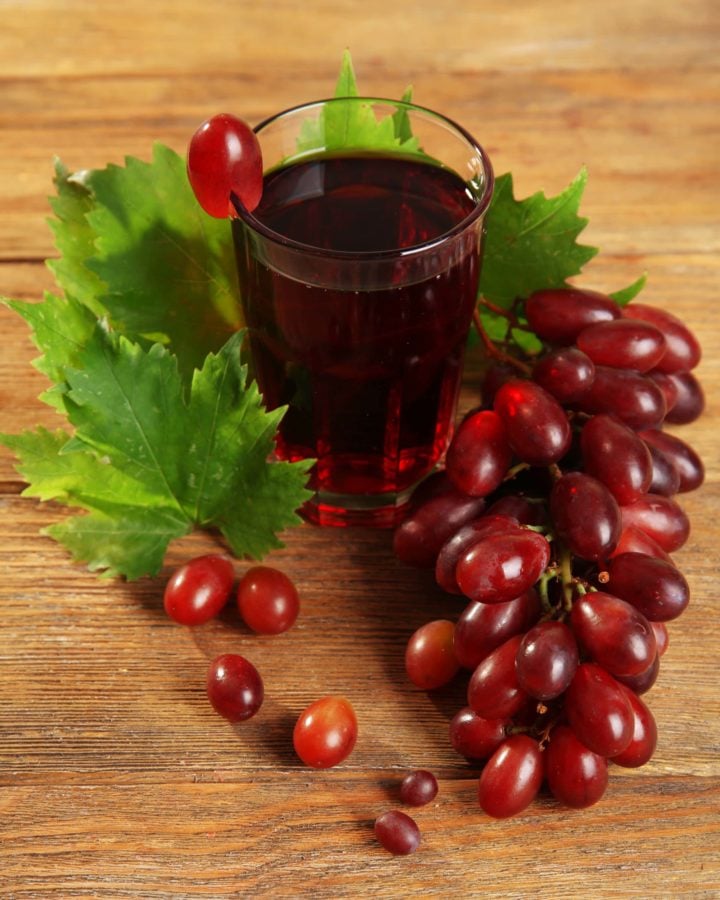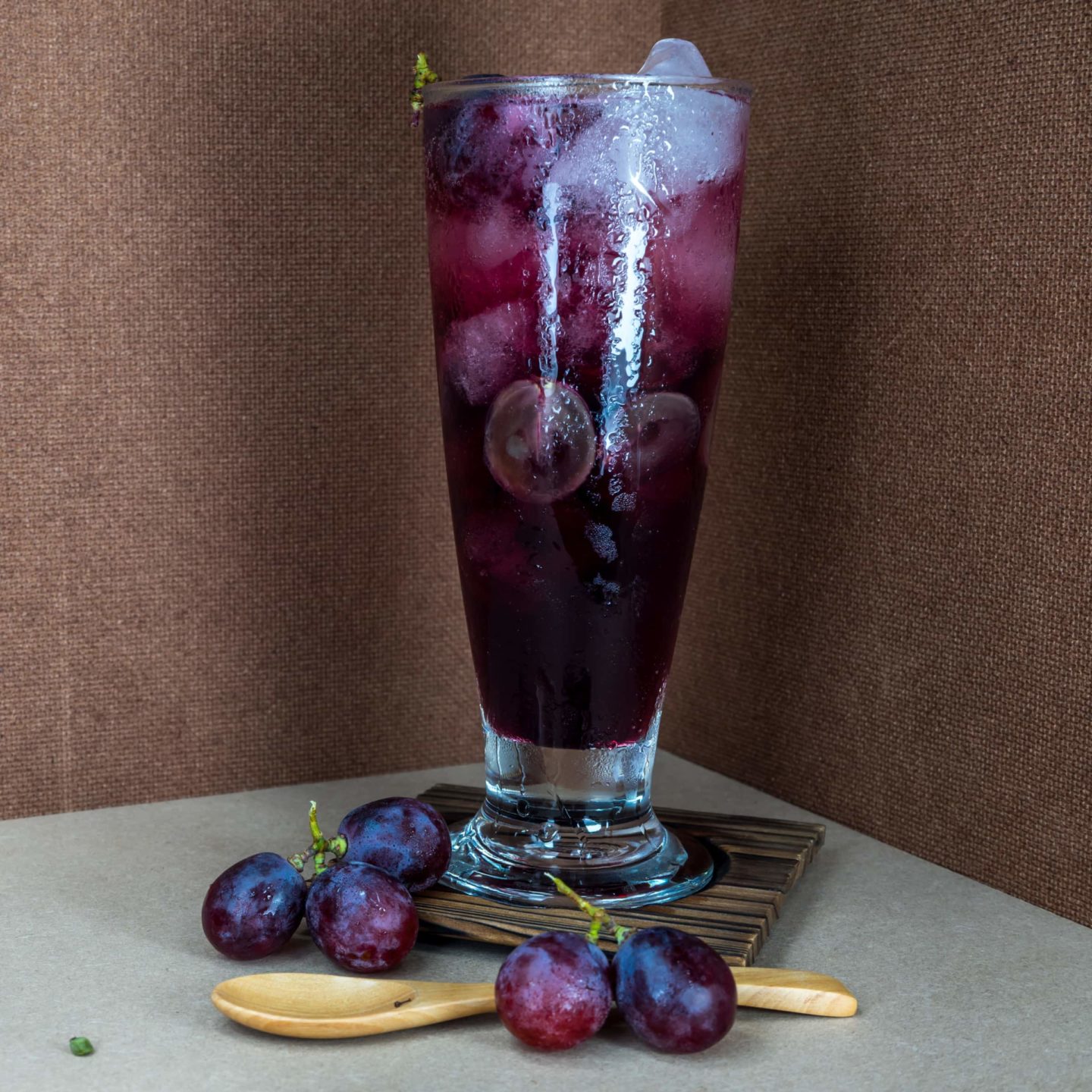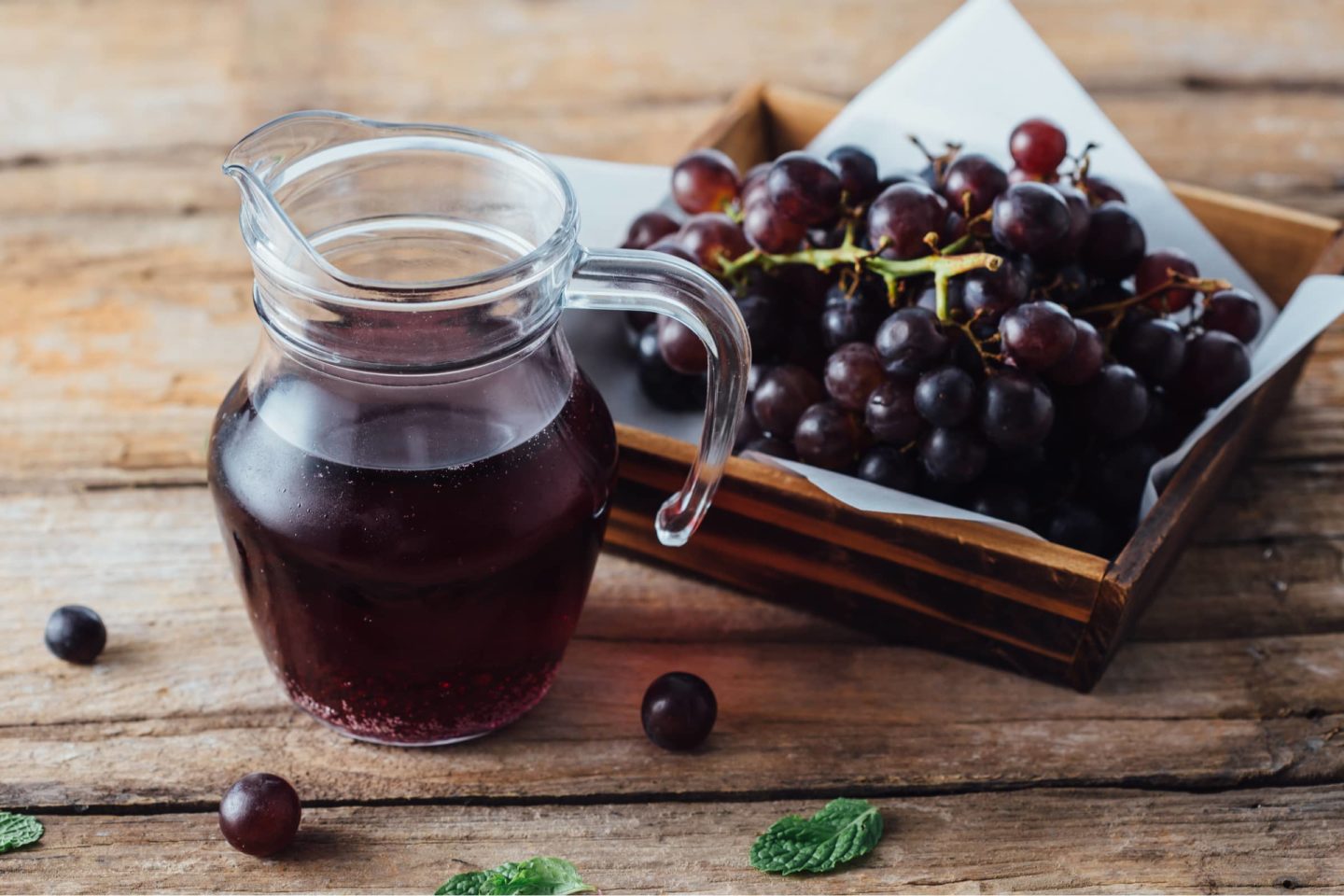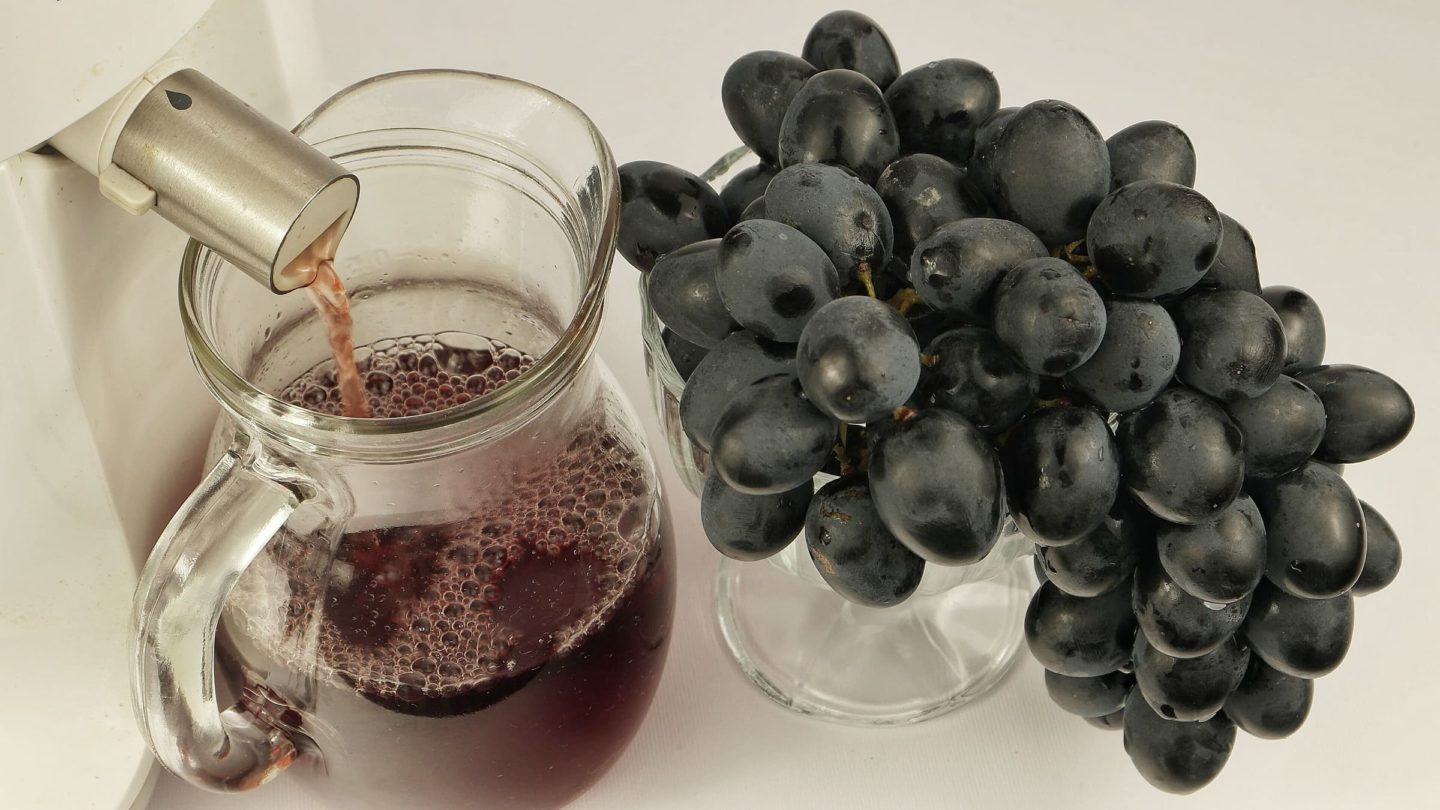
Constipation is a struggle for many. Infants, toddlers, and even adults suffer from constipation at some point. Even worse, most of the commercially available laxatives have unpleasant tastes that make you feel nauseous. Aside from that, typical side effects of laxatives include bloating, flatulence, and even dehydration. Fortunately, grape juice offers mild laxative effects without the side effects, plus the undeniably great taste!
Grapes have been grown for thousands of years. These little fruits are packed with antioxidants and minerals. They contain vitamin C, vitamin K, dietary fiber, sorbitol, potassium, and magnesium — all of which can help ease digestive difficulties, including constipation. In effect, grapes have modest laxative qualities in addition to their lovely sweet flavor.
One of the most prevalent causes of constipation is a lack of liquids or fiber intake. Grape juice soothes your intestines and helps you defecate since it is high in fiber and water content. Even when you're not constipated, you will still benefit from drinking grape juice because it's a natural laxative that has a variety of nutrients and can help regulate bowel movement.
In this article, we will help you understand each of the nutrients in grape juice that has a laxative effect and how they really work together. If you have any bowel problems, you might want to stick around.
Table of Contents
How Does Grape Juice Make You Poop?
Crushing and mixing grapes into a liquid yields grape juice. Must is a term used in the wine business to describe grape juice that comprises 7–23% pulp, skins, stems, and seeds. Grape juice's sugars allow it to be used as a sweetener and fermented into wine, brandy, or vinegar.
Grape juice is a powerhouse of nutrients. Aside from possessing a mild laxative effect, it contains a lot of antioxidants that help with reducing inflammation, strengthening immunity, and preventing a lot of diseases. In this section, we will discuss each of the contents of grape juice that play a role in its laxative effects.
Fiber in Grapes
Fiber, a non-digestible carbohydrate, is necessary for intestinal health. However, unlike other carbohydrates, it does not break down into sugar molecules and instead travels through the body undigested. Fiber controls the body's glucose utilization, which aids in the control of appetite and blood sugar levels.
Dietary fibers are classified into two types: insoluble and soluble.

Insoluble fiber absorbs water as it travels through your digestive tract. That causes your stools to become bigger and heavier. The increased weight of the digestive waste aids in its passage through the intestines, while its expanded size activates muscles that push stools through the colon.
As a consequence, you have regular bowel motions and are less likely to become constipated. Insoluble dietary fiber also aids in the prevention of some gastrointestinal issues, such as diverticulitis, where the intestines form pouches because of inflammation.
Insoluble fiber accounts for around 0.8 gram of the total fiber in 30 red grapes.
Soluble fiber produces a gel-like structure in your stomach, slowing the pace at which digested food exits. This helps you feel fuller, which may aid in weight loss because you eat less. It also inhibits carbohydrate absorption, preventing significant increases in blood sugar shortly after eating.
Soluble dietary fiber helps decrease cholesterol because it transports cholesterol out of the body. Another advantage of some forms of soluble fiber, such as pectin that's found in red grapes, is that it ferments in the large intestine. That promotes the growth of beneficial bacteria.
When planning your meals, remember that 30 red grapes provide around 0.5 gram of soluble fiber.
Water Content
One of the most common reasons for persistent constipation is dehydration. The food you consume travels from your stomach to the large intestine, which is sometimes known as the colon. If your body doesn't have enough water, the large intestine absorbs water from your dietary waste. This produces firm stools that are difficult to pass.
Water is the key if you’re looking for the easiest and cheapest way to deal with constipation. Water is vital for our organs to function, and the digestive system needs it as much as every other system does. Water is essential for digestion. It keeps the food you consume flowing through your intestines while also keeping them smooth and flexible.
Grape juice is made up of 85% water. Aside from the fiber in this fruit juice, the water content is the major reason for its effect against constipation. According to Healthline, drinking eight 8-ounce glasses of water every day relieves constipation. In this case, add water to all the other beneficial contents of grape juice, and you will definitely start going to the bathroom more often!
Sorbitol: A Natural Laxative

The sorbitol content of grape juice is somehow controversial. Some articles suggest that grapes do not contain sorbitol, and some claim that they do. However, in a study for the 39th World Congress of Vine and Wine, nine varieties of grapes were tested, and it was revealed that grapes do contain sorbitol and that red grapes contain more sorbitol than white grapes.
What is sorbitol, and how does it ease constipation? Sorbitol is a polyol (sugar alcohol) found in fruits (prune juice, pears, and apple juice) and plants. It is synthesized from glucose and used as a sugar replacement in a range of dishes.
When consumed in excessive amounts, sorbitol works as a diuretic and has a laxative effect. Because of that, it's often used as a laxative or irrigating agent. It works by attracting or pulling water to the stomach and softening the hardened stools for easier transit. And because grapes contain sorbitol, it acts as stool softeners.
Rich in Fructose
Fructose is a natural sugar present in honey and fresh fruit. When it comes to blood sugar and carbs, your body doesn't react any differently to naturally occurring fructose in fruit than it does to artificial sweeteners like corn syrup, making it a healthier source of energy.
There are 8.1 grams of fructose for every 100 grams of grape juice, making it one of the fruits with the highest fructose content. Fructose is a sugar that is poorly digested in our intestines. Like fiber, when there are high levels of fructose in the body, the primary reaction is to expel it via bowel movement.
Too much sugar in the intestines causes diarrhea, according to Harvard Health Publishing: "Sugars stimulate the gut to put out water and electrolytes, which loosen bowel movements. If you ingest a lot of sugar, you may develop diarrhea."
"Seventy-five percent of people who ingest more than 40 to 80 grams of fructose per day will get diarrhea," says gastroenterologist Dr. Norton Greenberger, a Harvard Medical School professor. On the other hand, fructose poses beneficial effects on patients with irritable bowel syndrome.
This only proves the ability of fructose to make you poop, but only on tolerable levels as it might result in losing essential electrolytes because of diarrhea.
Contains Malic Acid

Aside from vitamin C, malic acid is an important acid in grape juice. Malic acid is an acid that is typically added to skincare products. It is the major acid in grapes, causing a slight sourness to the taste (milder in raisins). In the intestines, malic acid stabilizes the stomach acid and stimulates digestion, causing one to poop.
Malic acid is also a potent metal chelator that binds to and deactivates harmful metals deposited in the liver. It also helps to break up gallstones and cleanses the liver.
Removing gallstones from the gallbladder promotes bile output and improves bile flow. Decreasing cholesterol and fat accumulation in the liver reverses fatty liver disease. These two mechanisms comprise detoxification, which leads to the removal of toxins from the intestines through regular bowel movements.
Contains Magnesium
Magnesium is a natural laxative. In fact, magnesium citrate is an over-the-counter laxative prescribed to patients suffering from constipation. This product is an osmotic laxative, which means it relaxes your bowels and draws water into them. The water softens and bulks up your feces, making it easier to pass.
There is 5 mg of magnesium for every 100 grams of grapes. Along with fiber, this mineral works wonders in keeping your digestive tract healthy.
Constipation: A Quick Guide
The information below is based on an article published by the Mayo Clinic.
Signs and symptoms of chronic constipation include:
- Passing fewer than three stools a week
- Having lumpy or hard stools
- Straining to have bowel movements
- Feeling as though there's a blockage in your rectum that prevents bowel movements
- Feeling as though you can't completely empty the stool from your rectum
- Needing help to empty your rectum, such as using your hands to press on your abdomen and using a finger to remove stool from your rectum
Moreover, when left untreated or unmanaged, constipation can lead to complications. The article also made a list of the complications that might come after prolonged constipation or when it becomes a chronic condition.
Complications of chronic constipation include:
- Swollen veins in your anus (hemorrhoids). Straining to have a bowel movement may cause swelling in the veins in and around your anus.
- Torn skin in your anus (anal fissure). A large or hard stool can cause tiny tears in the anus.
- Stool that can't be expelled (fecal impaction). Chronic constipation may cause an accumulation of hardened stool that gets stuck in your intestines.
- Intestine that protrudes from the anus (rectal prolapse). Straining to have a bowel movement can cause a small amount of the rectum to stretch and protrude from the anus.
How to Make Grape Juice at Home (A Quick Guide)

Although there are a lot of commercially available grape juices, most of these have preservatives and additives such as sugar, coloring, and additional flavors. Of course, making your own is the best way to get the most benefit from this lovely drink. Here’s a quick guide for you.
- Select the grapes: Put on long sleeves and a cap and get a big basket. Bring the clippers and load your basket with grape bunches. Remember that a pound of grapes yields slightly less than a cup of fruit juice.
- Rinse and de-stem the grapes: Fill a bowl halfway with water and place the grapes in it. Then rinse the individual grapes, pulling them away from the stem, gathering them in a large basin, and discarding the green unripe and old shriveled grapes.
- Make a mash out of the grapes: Mash the grapes with a potato masher until the juice begins to run. If you've picked a lot of grapes, you may need to work in batches.
- Cook the grapes: Fill a large stockpot halfway with crushed grapes. Bring the grapes and juice to a simmer over medium heat and continue to cook for 10 minutes. Stir often to prevent the grapes from sticking to the bottom of the pan. Mash some more halfway through cooking, breaking up as much of the leftover grapes as possible.
- Strain grape mixture: To strain, ladle grape mixture through a fine mesh screen or cheesecloth. Allow straining to set for several hours or overnight in the refrigerator.
- Collect juice: Once straining is complete, you can run water over the cheesecloth to remove more juice and dilute the mixture. Store and enjoy!
Other Fruit Juices that Prevent Constipation
Aside from grape juice, prune juice, apple juice, pear juice, cranberry juice, grapefruit juice, and even orange juice offer constipation relief. Prune juice contains a large amount of sorbitol, while apples and pears contain malic acid.
While prune juice may be an acquired taste, fruit juices like apple juice, grape juice, and lemon juice are favored by many. They contain high levels of vitamin c and win the taste test hands down.
For dietary fiber content, seeds are a great addition to your recipes. Flaxseed and chia seeds are high-fiber foods that are rich in protein and other minerals.

Conclusion
Does grape juice make you poop? Yes. Grape juice is a fantastic option for relieving constipation. It contains water, which prevents bowel obstruction. Grapes contain dietary fiber, which aids in the passage of stools.
They also contain sorbitol in addition to water and fiber. Drinking up to 200 ml of grape juice not only prevents constipation but also provides other benefits to one’s health. Note that drinking grape juice might produce green poop. But there’s no need to worry as green stool is entirely normal.

Leave a Reply